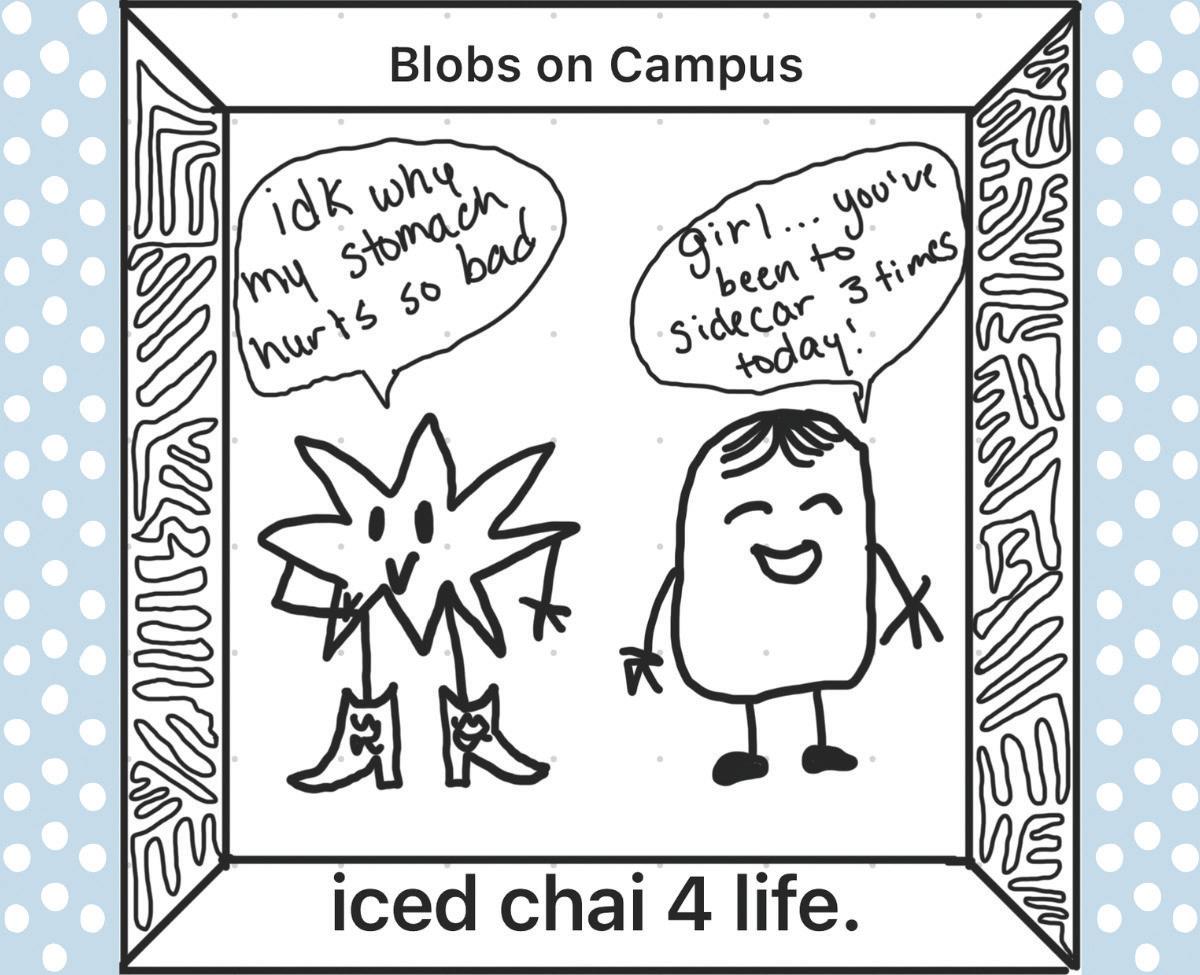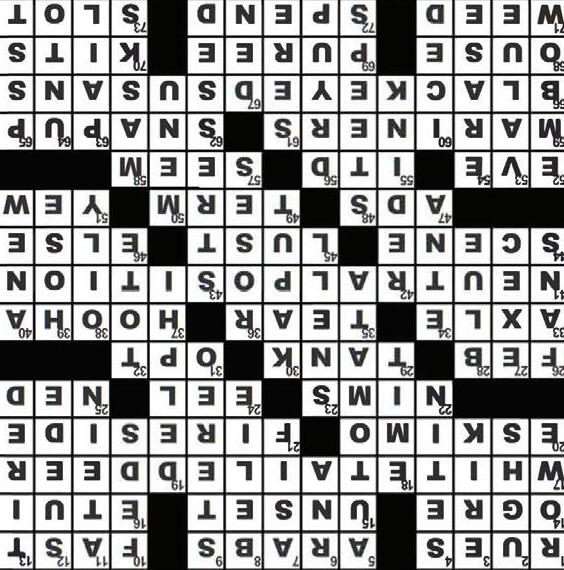


CEDAR
FALLS, IA




FALLS, IA
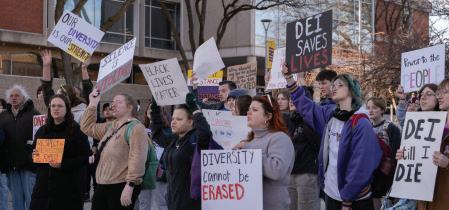
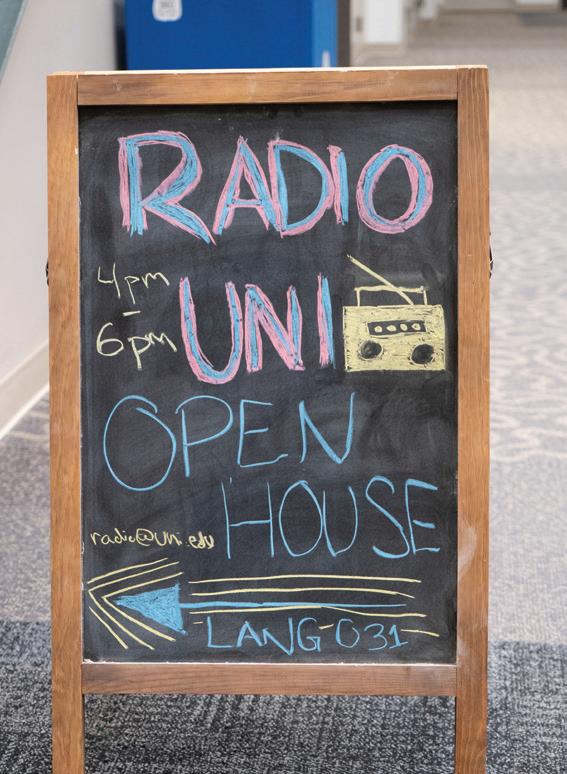
CAMPUS LIFE
Executive Editor Bailey
Klinkhammer highlights the new student organization, Radio UNI
SEE PAGE 6
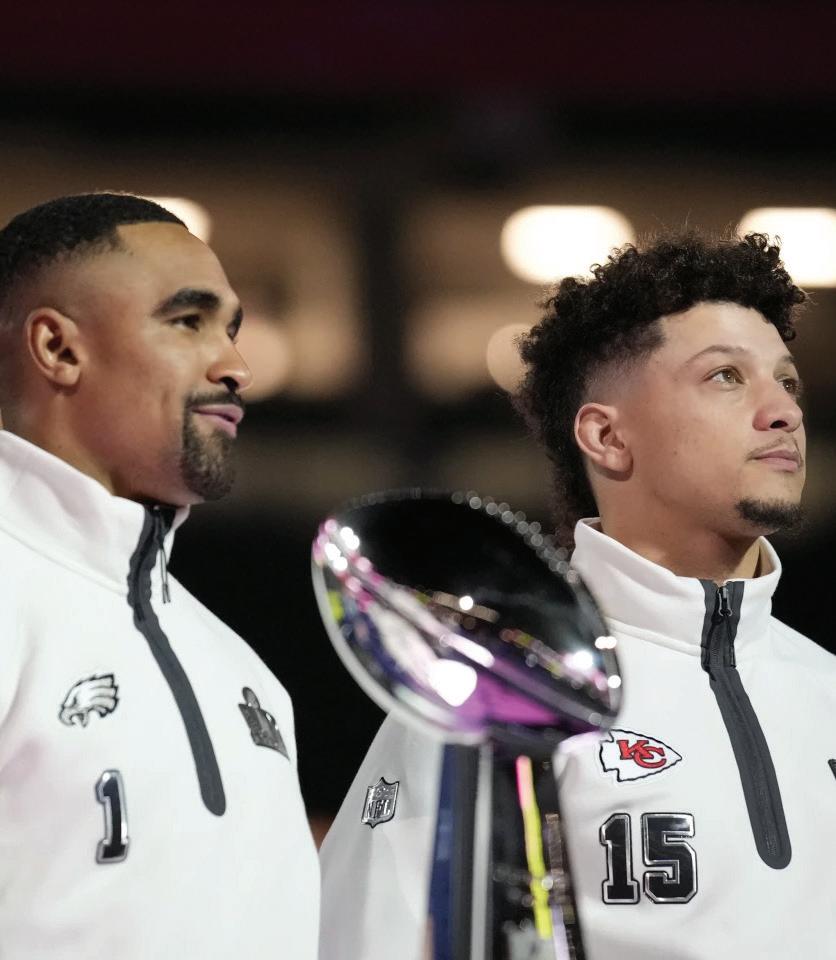
SPORTS Sports writer, Michal Spahn, previews Super Bowl 59, taking place this weekend SEE PAGE 11
JO BRAHMS News Editor
On Wed. Jan. 29, UNI
Proud held a peacful protest in response to the new language in UNI’s proposed strategic plan update. Proud is UNI’s social and political LGBTQ student organization on campus. Allie Clark (they/ them), is a double major in Social Work and Psychology and also serves as the ’24-25 Proud President.
Clark says that Proud is a safe place. “We are fighting for principles that push an inclusive campus environment for people who are LGBTQ and their allies. We host safe spaces for both queer students and allies to destress and just have somewhere to exist free of any judgment. We’re also really involved in activism and advocacy efforts, both on campus and in the community. Those efforts include protesting, running awareness campaigns and spreading information. We also like to have panels and seminars for faculty, students, and external organizations like the public library and ThreeHouse.”
The changes to UNI’s proposed strategic plan update are due to Iowa Senate File 2435 which, among other things, imposes restrictions
on diversity, equity and inclusion offices at the regent universities. Govenor Kim Reynolds signed the file into law on May 9, ’25. However the law will not go into effect until July 1, ’25. UNI has already restructured several offices in compliance with the impending law.
Clark expressed frustration with the university haste to make the changes. “It’s really frustrating knowing that when all the changes were first happening, student life got reorganized so that international engagement and veterans affairs stayed. The university cherry picked which departments offices they felt were worth saving. At the
end of the day, they did not choose to a lot of the offices and resources within the CME and within Gender and Sexuality Services.”
While the changes in verbage may seem inconsquential, Penelope Wilmoth (she/they) the social activism and outreach coordinator for Proud this year, is unhappy with the changes that have been made to the proposed strategic plan. “The changes that were made to the proposed strategic plan are based in ideas of ableism, of racism, of homophobia, of transphobia, of classicsm. It was hard to see verbage directly relates to me being crossed out in red ink.”
Mara Blevins,
(she/they)
director of media relations for Proud said that even finding the proposed changes was a struggle. “The only reason we even found that the proposed plan had been completely redone and was because I had read through a whole email from the university. It was tucked away at the very bottom. Most people I know did not read through that email.”
The potential changes are not reflected on the UNI website or on the Board of Regents website. Wilmoth says that while they know the changes are unavoidable, she feels left out of the conver-
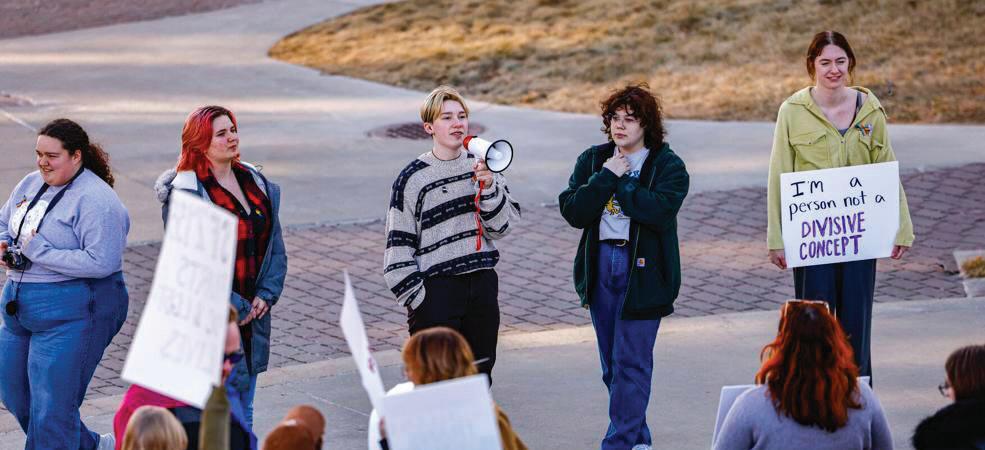

BAILEY KLINKHAMMER Executive Editor
Shortly after the closure of College Hill’s Little Bigs bar, the owner of Social House acquired the property and have spent the past three years brainstorming, demolishing and reconstructing the space to create a new bar specifically for college students at UNI. The bar, named The Undergrad, is tentatively set to open this spring, and will feature a golf and gaming simulator, as well as a dance floor and DJ booth.
Kyle Dehmlow, the owner of Social House, noted that the lack of spaces for UNI students specifically on the Hill fueled the group’s brainstorming when they were initially deciding what to do with the space. “When people go out, they normally don’t just stay in one place, they normally bounce around to here and there,” said Dehmlow. “So a part of opening a new bar is to give people more places to go on the Hill. We want
continued from page 1
She feels left out of the conversation. “I would say that the changes to the Strategic Plan that have been made and similar changes across Iowa have made marginalized students, in my experience, feel left out of the conversation. It feels like there’s not protections put in place to make sure that I have an equal and adequate education when compared to students who are not marginalized based on their identity.”
Wilmoth expanded on their thoughts, saying “We do understand that the university does have this file that tells them what they do have to change. That is why in our advocacy we always make sure to include that we are against this file and this plan, because they both go hand-in-hand. The senate file is what led to the plan revisions. But, they’re both bad. We understand that changes had to be made, but
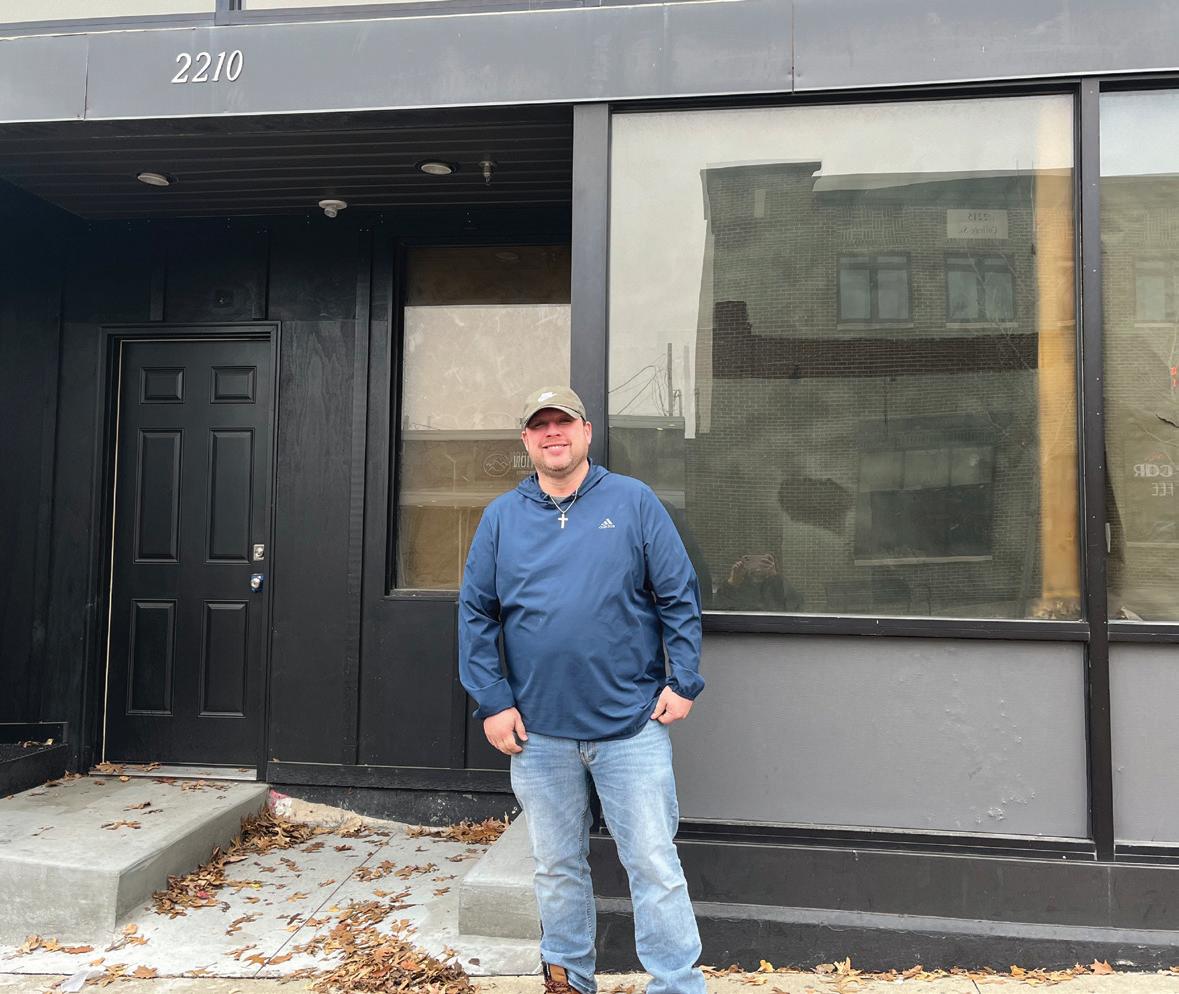
people to come to the Hill and we want them to stay on the Hill.”
For both Dehmlow and Jorge Covarrubias, Social House general manager, The Undergrad isn’t just a bar. When conceptualizing the bar, they wanted a space that students could come hang out at, and get a drink if they
just wish there was more support for the marginalized students on campus.”
The group says that there are many ways for people to get involved. Clark says “There is always a bit of hesitancy from community allies to get involved with diverse student orgs. Allies can and should show up and be involved.”
They continue on to explain, “DEI rollbacks hurt everyone, even those identities that aren’t marginalized, because DEI includes everybody. It is important to have these vulnerable conversations and address the gaps that exist, and it is important to know that everyone has a space in that conversation. If you have privilege, you should be using it to amplify the voices that are being silenced or pushed back against.”
Across the community, many are saying the same thing, “support each other”
wanted. With the integration of the golf and gaming simulator, they hope that students are able to participate in other games or activities. “Really, this space will become what people make of it,” said Dehmlow. “We have the simulator, we’ll have the dance floor, we’ll have music bingo, but it’ll
be what the people bring that’ll make the space. The crowd will dictate what’s popular here.”
On top of providing activities geared towards students, Dehmlow and Covarrubias discussed plans to mainly play college games on the TVs featured at The Undergrad, focusing mainly on UNI games. This is not only in an effort to make the space more inviting to students, but to encourage students who aren’t drinking to come hang out in the space as well.
Dehmlow also discussed that they plan on renting the space of The Undergrad Bar out to parties and student organizations who want to host events. “It doesn’t have to just be parties,” said Dehmlow. “I’d really like for student organizations to rent the space out for fundraisers or group socials, things of that nature.” While the rental pricings are still to be determined by Dehmlow and his team, they expressed excitement at the thought
of being able to provide off-campus spaces for student organizations seeking venues. “We’re really looking to help foster community,” Dehmlow said. While The Undergrad Bar is tentatively set to open this spring, Dehmlow and his team have poured in years of work into the location, installing entirely new flooring and modifying the space to fit the vision the team had for the bar. “I’m excited for when we are ready to open and can share all of the work we’ve put into modifying the space to the public,” said Covarrubias. “I think a lot of people who have been in this space before will be really shocked at how it’s changed.” While some construction to the space is still underway, most renovations are either being finished or have wrapped. Dehmlow and his team still hope to open The Undergrad before the end of the semester.
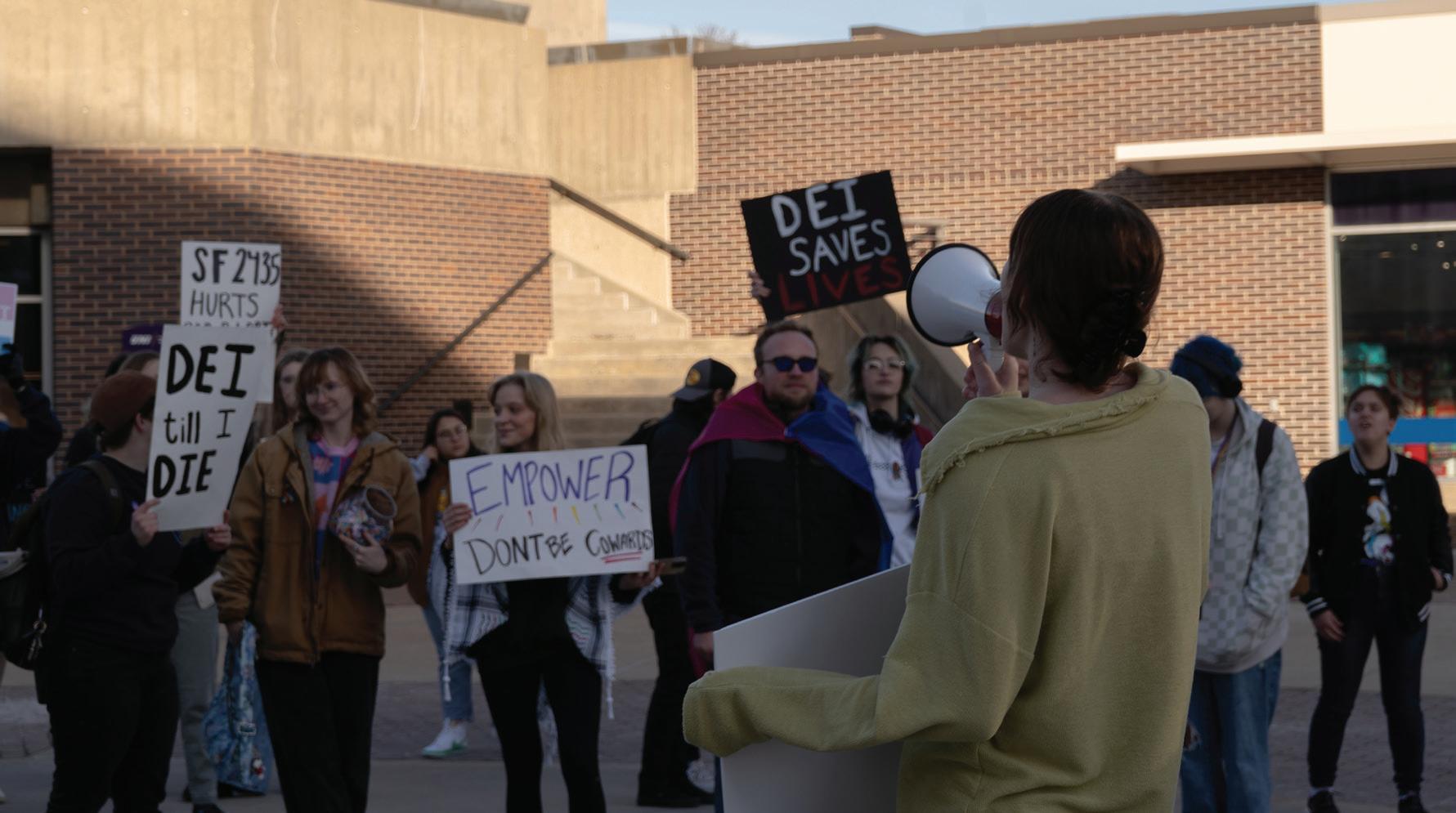
One protestor who wished to remaim anonymous said “Nobody can take who you are. You are still a person. You know your identities are important. Lean on your peers. Take it one day at a time. If you show up we can get through it as a community.”
UNI Proud meets biweekly in the Rod Library Makerspace on Thursdays. Their next event will be focused on creating flower arrangements that are based on queer history. It will take place on February 13th. For more information about UNI Proud, follow them on Instagram @ NorthernIowaProud.
L011 Maucker Union Cedar Falls, IA 50614 www.northerniowan.com northern-iowan@uni.edu 319.273.2157
NORTHERN IOWAN BAILEY KLINKHAMMER Executive Editor klinkbaa@uni.edu 563.321.1640
ESTELLE JOHNSON Managing Editor johnsecr@uni.edu 319.290.4955
EDITORIAL STAFF
JO BRAHMS News Editor brahmsj@uni.edu
JENNA WESTENDORF Campus Life Editor westejac@uni.edu
COHEN KAMAUS Sports Editor kamausc@uni.edu
ANTONIA GOODWIN Copy Editor
LUIS ALVAREZ Spanish Editor alvarlaa@uni.edu
MACI SWANSON Head Photographer maciswan@uni.edu
PRODUCTION STAFF
ESTELLE JOHNSON Webmaster
ADVISERS
ANELIA DIMITROVA anelia.dimitrova@uni.edu
CHRIS MARTIN christopher.martin@uni.edu
CIRCULATION
BETHANY WINGET Circulation Manager
The Northern Iowan is published weekly on Wednesday during the academic year, except for holidays and examination periods, by the University of Northern Iowa, L011 Maucker Union, Cedar Falls, IA 506140166 under the auspices of the Board of Student Publications. Advertising errors that are the fault of the Northern Iowan will be corrected at no cost to the advertiser only if the Northern Iowan office is notified within seven days of the original pub- lication. Publisher reserves the right to refuse any advertisement at any time. The Northern Iowan is funded in part with student activity fees.
All material is © 2025 by the Northern Iowan and may not be used without permission.
LETTERS TO THE EDITOR Letters must be less than 300 words in length and are subject to editing. Not all submissions will be printed. Send submissions to northerniowan@uni.edu.
SEND US STORY IDEAS Tell us what’s happening on campus. Email submissions to northern-iowan@uni.edu.
Do you want to have an event listed here? Email us at northern-iowan@uni.edu with information about the event to have it featured.

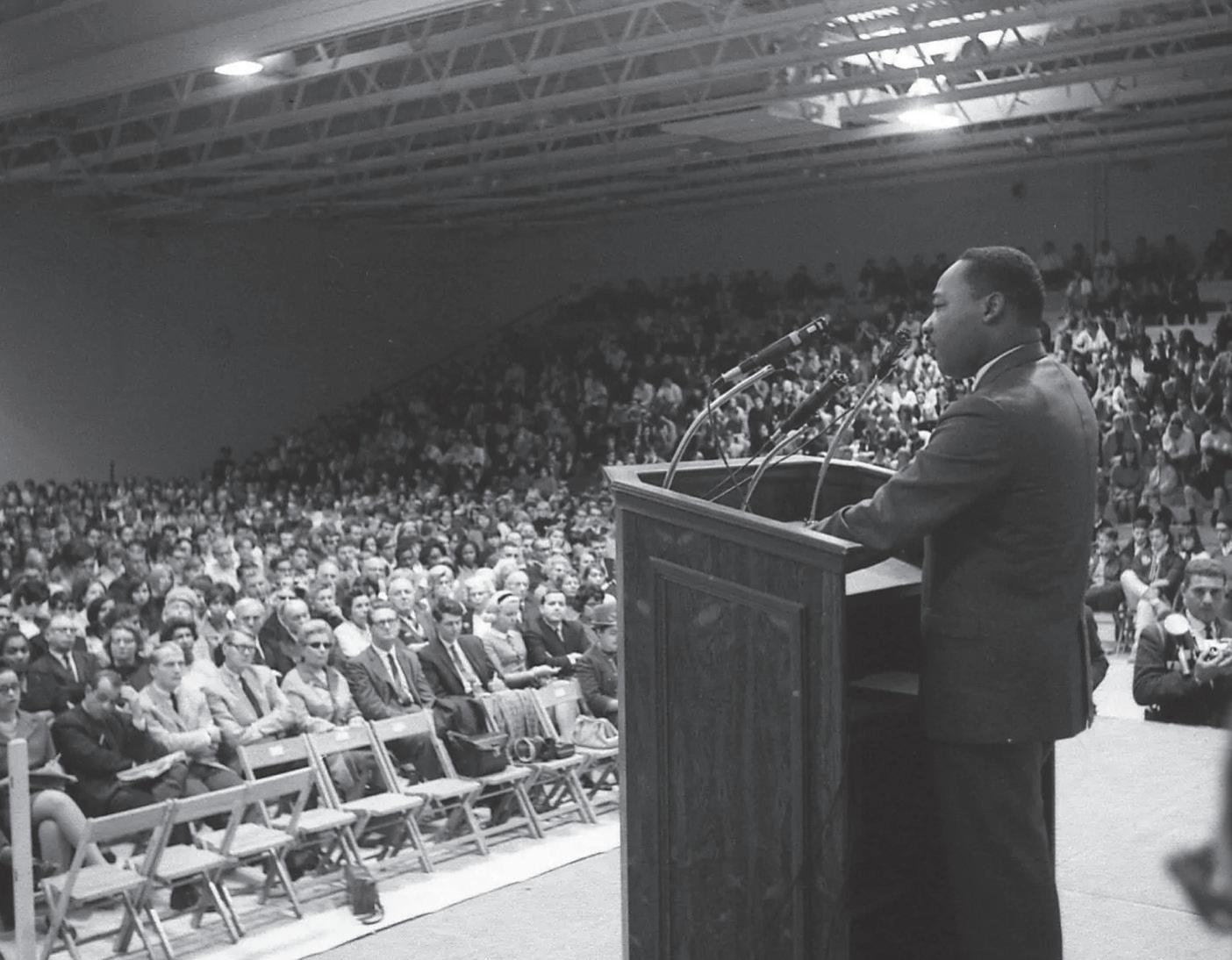
65 years ago, Reverend Martin Luther King Jr. visited the University of Northern Iowa’s Lang Hall Auditorium to deliver a speech regarding the Montgomery bus boycott that helped catapult the civil rights movement into motion. On Nov. 13, 1959, the Northern Iowan, then named the College Eye, published an article entitled “King Tells Bus Boycott to Full House on Wednesday,” providing direct quotes from King and a summary of his speech. Below is the full, archived transcript of the College Eye’s article.
The story behind the Montgomery, Alabama, bus boycott was told Wednesday when the Rev. Martin Luther King spoke to a “full house” of students and faculty here. A summary of his speech follows.
Rev. King says there has been a radical change in the attitude of the Negro in the past years. The attitude by the whites in the past has been that the Negro is mere property, not a human being. The real tragedy in this is that it has given the Negro a false sense of inferiority and insecurity.
But, gradually, as the
Negro became more literate, he began to take a new look at himself. This led to a determination to struggle and sacrifice until justice and freedom became realities – until the walls of segregation were crushed.
Before December 5, 1955, bus drivers referred to Negros as “black cows” or “black apes.” Negros often had to pay their fare at the front of the bus, get off, and board the bus again at the back. In the meantime, the bus might have pulled away with the fare, but without the Negro. When Mrs. Rosa Parks, a Negro, refused to vacate her seat for a boarding white male passenger in the section of the bus not reserved for whites, she was immediately arrested. Her trial was set for the next Monday. Between the time of her arrest, leaflets appeared telling the Negros to boycott the bus the day of her trial.
That day, the buses were empty of Negros, who normally contribute 75% of the passengers. The Montgomery Improvement Association was formed. Most of the Negro ministers of Montgomery are members of the executive board, and this was the steering organization for the boycott.
A meeting was called for the night of Mrs. Parks’s trial, and the meeting place was filled to capacity. It was voted unanimously to continue the boycott until there would be more courtesy extended to Negro passengers; seats would be given on a first come, first served basis; and some Negro drivers would be on at least the predominantly Negro lines.
Fifty thousand Negroes decided to substitute tired feet for tired souls by walking proudly instead of riding in humiliation. The Association has to face the problem of how to get the ex-bus-riders around the city. Negro taxis agreed to transport Negro passengers for ten cents, but this only lasted three days, because the city commision placed a minimum rate of fifty cents for all taxis.
A pool of over 300 cars was then formed overnight. Stations for picking up and dropping off passengers were set up, most of them at churches. A system was worked out in just a few days that had taken the city years to form. Fifteen station wagons were purchased from donations from various companies.
The white reactionaries and the city government
tried to negotiate a compromise with the Negroes, but all they would say was that the conditions asked for by the Negroes “couldn’t be met.” They brought in white ministers to discuss the situation who said that “It’s getting near Christmas, so let’s go back to riding the buses, pray, and think about the birth of Christ and everything will work out all right.”
False rumors were circulated about the leaders of the boycott, claiming that they were exploiting the Negroes and making thousands of dollars in the process. They tried to create jealousy by appealing with the older ministers, since most of the leaders were young men. The Mayor of Montgomery made a speech on television saying that the city government was “tired of playing around” and was going to “get tough.”
Immediately following this, a series of arrests were made of Negroes for minor or imaginary reasons. All of these arrests only made the Negro community more determined to attain their objective. They were finally freed of their crippling fear. From the beginning, the understanding of the philosophy of the boycott was
nonviolent resistance. They refused to ride the buses, but they did it with love in their hearts, rather than violence. They tried to defeat a system, not individuals. “If the Negroes succumb to using violence, their chief contribution to posterity will be an endless night of meaningless chaos,” said Reverend King. “It is a question of non-violence or non-existence.”
In conclusion, he said, “The concept of understanding, creative, redemptive love which seeks nothing in return, which can love the person doing the deed while hating the deed was the center of the movement. We felt in our struggle that we had cosmic companionship – while we walked, we didn’t walk alone.”
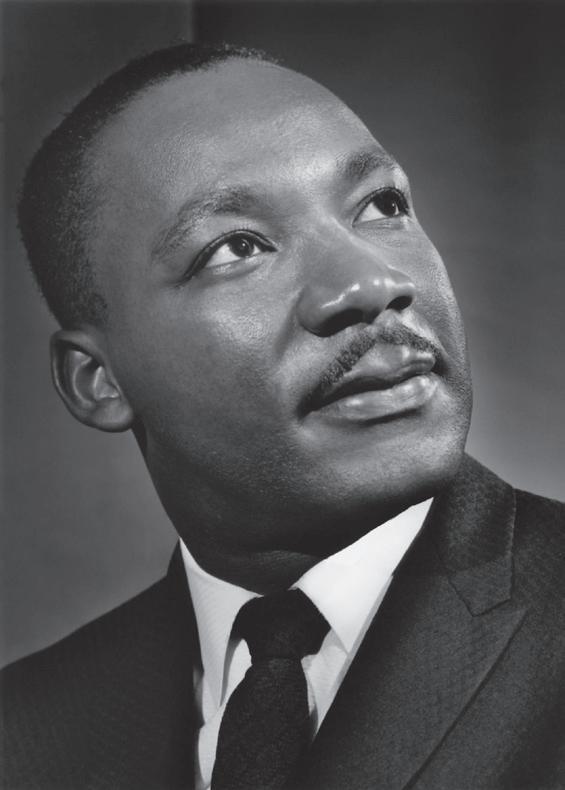

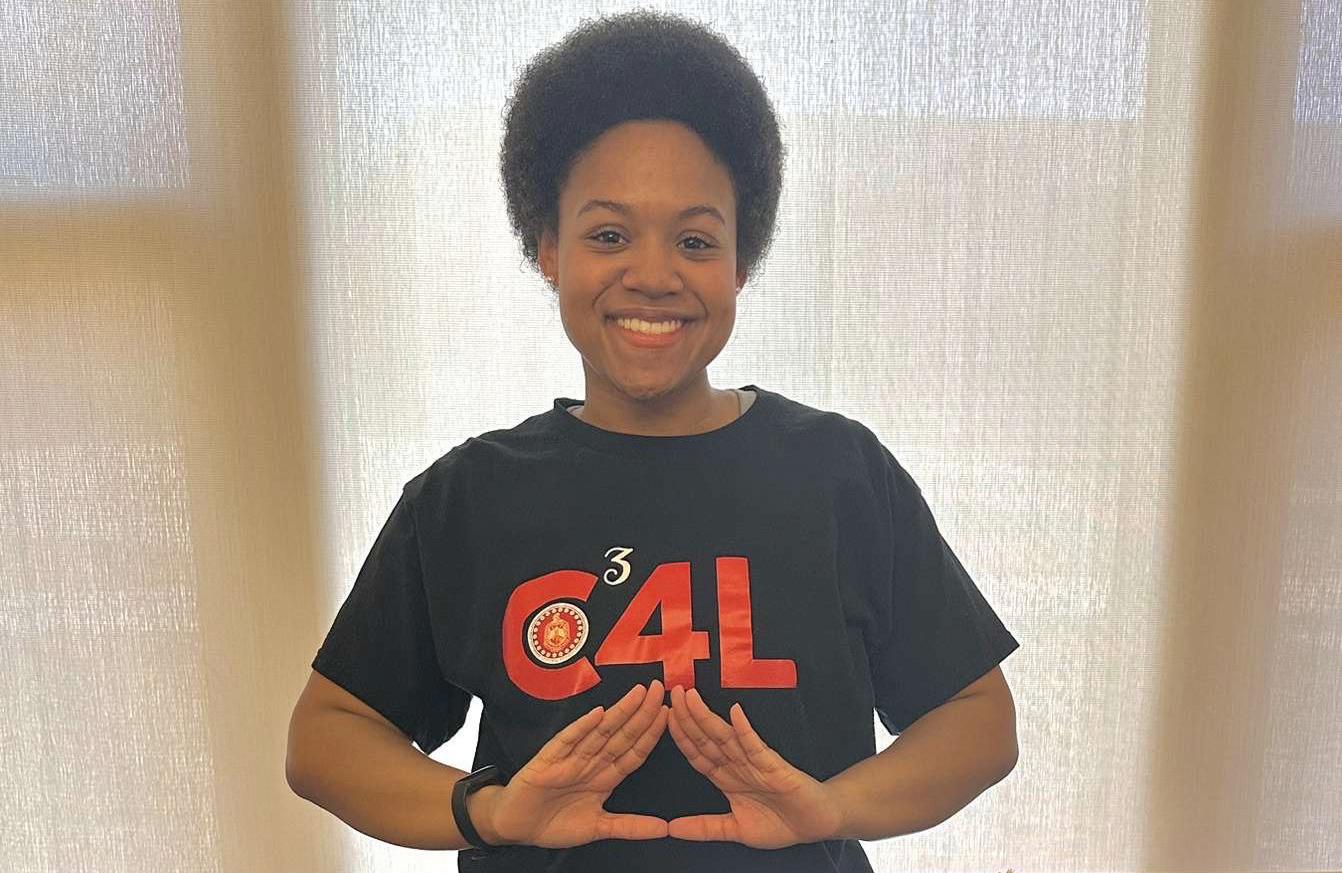
JENNA WESTENDORF
Editora de la columna Campus Life
KATHLEEN HUNTER
Traductora invitada
En 2023, solo había una sororidad multicultural en la universidad, Lambda Theta Alpha. Sin embargo, la cifra de inscripción ha bajado en los últimos años. Ahora, con la ayuda de Kaylynn Ruffin, miembro de la sororidad y presidenta del capítulo Tau Chi, Delta Sigma Theta ha surgido como otra sororidad multicultural. Es la única sororidad en UNI que es parte de la organización nacional Divine Nine, un grupo de fraternidades y sororidades que históricamente celebran la cultura afro-estadounidense. Ruffin ha tenido un gran papel en devolver y solidificar la presencia de Divine Nine en UNI.
Delta Sigma Theta ha tenido mucho éxito en el último año. Un logro notable fue su nominación a “nueva organización más prometedora” en los premios de las organizaciones estudiantiles de UNI. Cuando el Northern Iowan habló con Ruffin hace un año, ella describió sus esperanzas para el futuro de
Delta Sigma Theta, incluyendo eventos por mujeres y para mujeres, con la intención específica de promover la salud e higiene femenina.
A lo largo del año pasado, Delta ha donado más de 60 libras de comida al Panther Pantry y más de 40 libras de productos de higiene femenina, y se espera que estas campañas de donación sean eventos anuales. “Otro gran logro ha sido la cantidad de eventos que tuvimos con muchos asistentes…todos los eventos fueron súper divertidos y ha sido increíble conocer a tantos fantásticos estudiantes aquí en UNI,” dijo Ruffin.
A pesar del éxito que ha experimentado Delta durante el último año, afianzar una organización estudiantil en el campus universitario nunca es fácil. “Yo diría que el desafío principal es el nivel de interés en hacer que la organización sea más conocida entre la población estudiantil.” Ruffin explicó en más detalle los retos que se enfrentaron, diciendo que entender los intereses de los futuros miembros, sus razones de querer unirse al club y cuánto de conectados se sienten a la organización,
puede ser un desafío también.
Con la nueva presencia de Delta en UNI, Ruffin dice que ha notado un cambio en la cultura estudiantil. Otras sororidades en campus se han puesto en contacto con las Deltas para ofrecerles su apoyo y palabras de ánimo. “Es genial ver a otras mujeres y sororidades apoyando a las Deltas mientras seguimos creciendo como mujeres,” comparte Ruffin. “Creo que las miembros del campus están emocionadas de ver la cultura y la comunidad expandirse, creando eventos y actividades que normalmente no se verían de forma regular.”
Las Deltas tienen muchos valores que podrían atraer a los estudiantes en busca de una sororidad multicultural. Ruffin declara que “cubrimos tantas partes diferentes de la vida cotidiana y la experiencia universitaria…y las Deltas, siempre queremos ser capaces de expandirnos y crecer dentro del potencial que ya tiene UNI a través de los eventos, estar en campus…y ayudar a construir conexiones.” Las Deltas trabajan para promover varias cosas, incluyendo eventos
educativos, la salud física y mental y promover la conciencia económica y política. Ruffin cree que ofrecer una tan gran variedad de eventos les permite comunicarse con más que un solo grupo de estudiantes.
A medida que crece la sororidad, Ruffin espera que la presencia de Delta se expanda más allá de la universidad a la comunidad del Cedar Valley. “Me encantaría organizar eventos aun más grandes, y siempre estar aun más involucradas en cosas como el desfile y otros eventos comunitarios, conectándonos con la comunidad en varias maneras.”
Ruffin espera que, algún día, la sororidad sea una organización que viva dentro de la comunidad, construyendo relaciones que duren. “Tanto si es organizar las campañas de donación de ropa, como trabajar con el banco de alimentos de Northeast Iowa… quiero que Delta haga más actividades que tengan un impacto amplio, no solo en UNI sino en la comunidad circundante también.”
En el futuro, Ruffin quiere que Delta Sigma Theta siga creciendo, incluso después de que ella se gradúe.
“Pienso que en el futuro, quiero que los estudiantes estén emocionados de saber qué hacen las Deltas, en qué están participando y cómo están teniendo un impacto en la comunidad,” dice Ruffin. Tiene la esperanza de que, algún día, las mujeres de Delta participen en un step show (programa de baile), o den un discurso sobre algo por lo cual sientan pasión. “Quiero que esta organización sea algo memorable.”
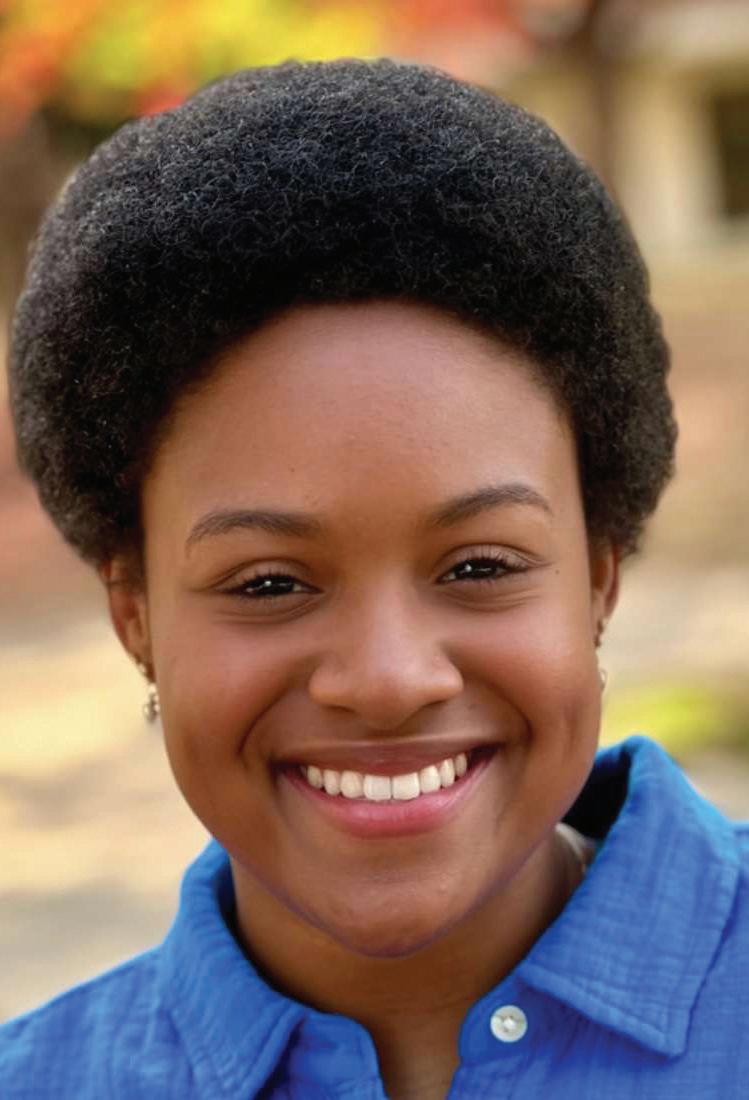
Uniendo
Disclaimer:
STEVE CORBIN Guest Columnist
Hugo Balta, executive editor of The Fulcrum, whose social media platform exhibits highly factual and credible ratings from Media Bias/Fact Check, wrote in his Jan. 25 op-ed “now is the time to advance on diversity, equity and inclusion (DEI) initiatives,” as opposed to President Trump and Elon Musk’s anti-DEI movement.
Let’s explore Mr. Balta’s contention from a researchbased and reference-laden perspective to see if his position is true or false.
First, Mr. Trump issued “a sweeping executive order directing federal agencies to terminate DEI programs,” according to Rueters’ “Despite Trump order, abandoning DEI could land companies in legal trouble,” article. Next, on Jan. 27, Secretary of Defense Pete Hegseth enacted Trump’s order by eliminating DEI endeavors at the Pentagon.
The Reuters article noted if companies comply with Trump’s anti-DEI executive order, they are “exposing themselves to more discrimination lawsuits by workers.” Companies who abandon DEI policies are specifically violating the Civil Rights Act of 1964, which prohibits employment discrimination based on race, sex, religion, color and national origin.
Alan Blinder, former vice chair of the Federal Reserve and economics professor at Princeton, scolded Trump for his “attacks on DEI and affirmative action” in his Jan. 28 Wall Street Journal op-ed. Every company and educational institution that depends on federal funding or holds government contracts is in legal jeopardy by following Trump’s edict.
On Jan. 27, the Wall Street Journal countered Trump’s anti-DEI and anti-affirmative action order by stating bluntly “discrimination in hiring isn’t allowed.” Mr. Trump has, for many years, veered into the anti-woke world, which means he discounts the value of social justice, equal rights and equal opportunity.
Jessica Guynn, a journalist for USA Today made three observations about the new administration in her Jan. 26 column. First, Trump’s anti-DEI initiative “began in earnest during Trump’s first


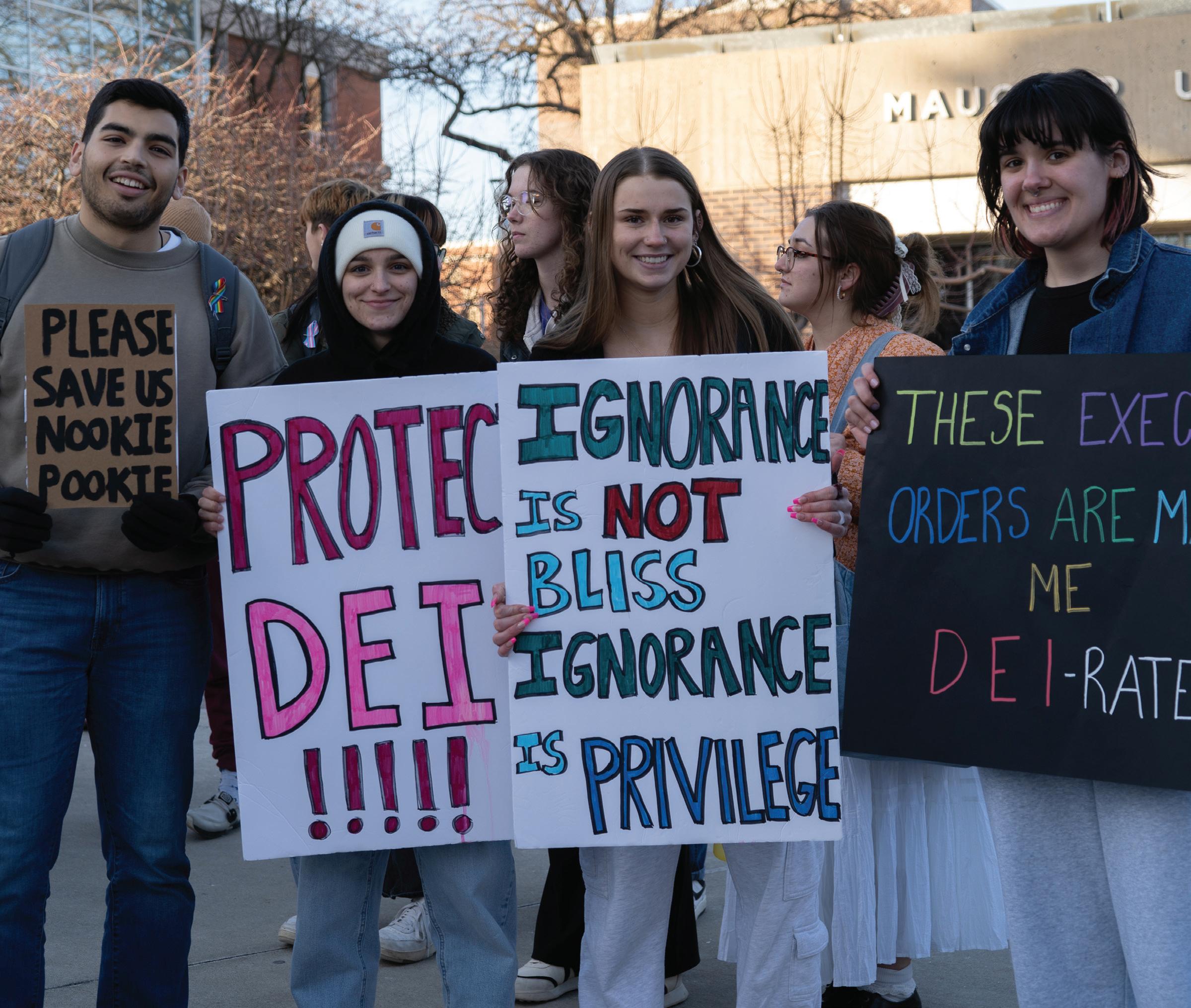
term and grew after he left office.”
Secondly, Stephen Miller, Trump’s deputy chief of staff for policy, “has filed dozens of legal actions against woke corporations.” Finally, Miller praises Harmett Dhillon, Trump’s lawyer to lead the Civil Rights Division of the Justice Department, for “suing corporations who use woke policies to discriminate against their workers.”
At the Sept. 10 presidential debate, Trump alluded to illegal immigrants voting in the Nov. 5 election. According to NPR, he was making reference to the Great Replacement Theory, which has “become mainstream in the Republican Party.” Over 200 reference citations about the Great Replacement Theory exist on the internet. The New York Times states this white nationalist far-right conspiracy theory preaches “racial minorities are displacing the
traditional white American population and take control of the nation.”
A May 2022 poll by Yahoo! News and YouGov revealed 61% of people who voted for Trump in 2020 agree with the core tenet of the great replacement theory that “a group of people in this country are trying to replace native-born Americans with immigrants and people of color who share their political views.”
Regarding immigration, Alan Blinder of the Wall Street Journal writes “Reducing illegal immigration has been a perplexing problem for decades, has bipartisan support and began happening in the Biden administration.” In Trump’s first term he expelled 2,011,280 illegal migrants as compared to Biden deporting 4,677,460 immigrants as of July, 2024.
Related to the great replacement theory, an official with the U.S. Air Force
confirmed to USA Today on Jan. 25, the end of Donald Trump’s first week of office: “The U.S. Air Force will no longer teach its recruits about the Tuskegee Airmen, the more than 15,000 Black aviators, mechanics and cooks in the segregated Army of World War II.”
Trump’s edict is viewed as an attempt to erase history of active Black fighters from 1940 to 1952, who flew in over 15,000 attacks and destroyed more than 100 German aircraft.
Trump’s action is reminiscent of George Orwell’s 1984 dystopian novel whereby Big Brother eliminated history he didn’t like.
It gets worse about members of the great replacement theory cult. Joseph Uscinski and Casey Klofstad, political science professors at University of Miami, found in their research “those who believed in these conspiracy theories were also
more likely to believe in other conspiracy theories and to be supportive of violence as a means to political ends.” Jan. 6, 2021, anyone? Research is replete that Hugo Balta’s assertion that now is the time to advance – versus retreat –DEI endeavors, is spot on. The same advancement should occur for social justice, equal rights, equal opportunity and employment discrimination based upon race, sex, religion, color and national origin.
Since a super majority of Americans are law abiding citizens, request your congressional delegates to uphold the Civil Rights Act we’ve embraced since 1964 and reject the anti-DEI, antiwoke and anti-affirmative action endeavors that may be in play to solve the great replacement conspiracy theory.

KULT 94.5 FM, UNI’s only broadcasting radio station, has announced a new name and a change in their services alongside their 70th birthday – now Radio UNI, the student-run radio station, is streaming-only through their website. Mikayla Capman, the General Manager of Radio UNI says that the change wasn’t just needed for the broadcasting station itself, but for listeners as well.
“Through broadcasting, KULT could only broadcast within a five mile radius of campus,” said Capman. “So DJs families and even some students couldn’t listen to broadcasts. Switching to streaming-only opens up our audience beyond campus.” On top of being able to widen their audience reach through streaming, Capman has also seen exponential growth for the radio station over the course of 2024. According to Capman, there was a point in 2024 where KULT had almost no DJs, and Capman was working with her advisors to keep the radio station afloat. Now, Capman’s contact list for DJs has grown to over 70 students.
“Seeing this kind of interest from students is really exciting,” Capman said. “It’s also taken a lot of work off of my shoulders, so I can focus on running the station and helping schedule DJs.” With a new wealth of DJs at Radio UNI comes a wealth of radio personalities. From diverse tastes in music to talk show hosts and now sports broadcasting, Capman thinks that Radio UNI has something for everyone.
On Radio UNI’s new website, users can find the schedule of DJs for the day and the rest of the week, alongside a description of what that DJ intends to broadcast.
“One hour you could be listening to 80s rock, and the next you could be listening to an astrology podcast, and then they’re playing Broadway tunes…I think that’s the beautiful part,” Capman said.
“I think that there’s a show for everyone.” Listeners can choose shows they listen to based on the descriptions given on the Radio UNI website. Despite the downturn in staffing from 2024, the radio currently boasts over 15 different scheduled and recurring shows from DJs, who broadcast anything from talk radio, to the Grateful Dead, to UNI Softball games.
According to Capman,
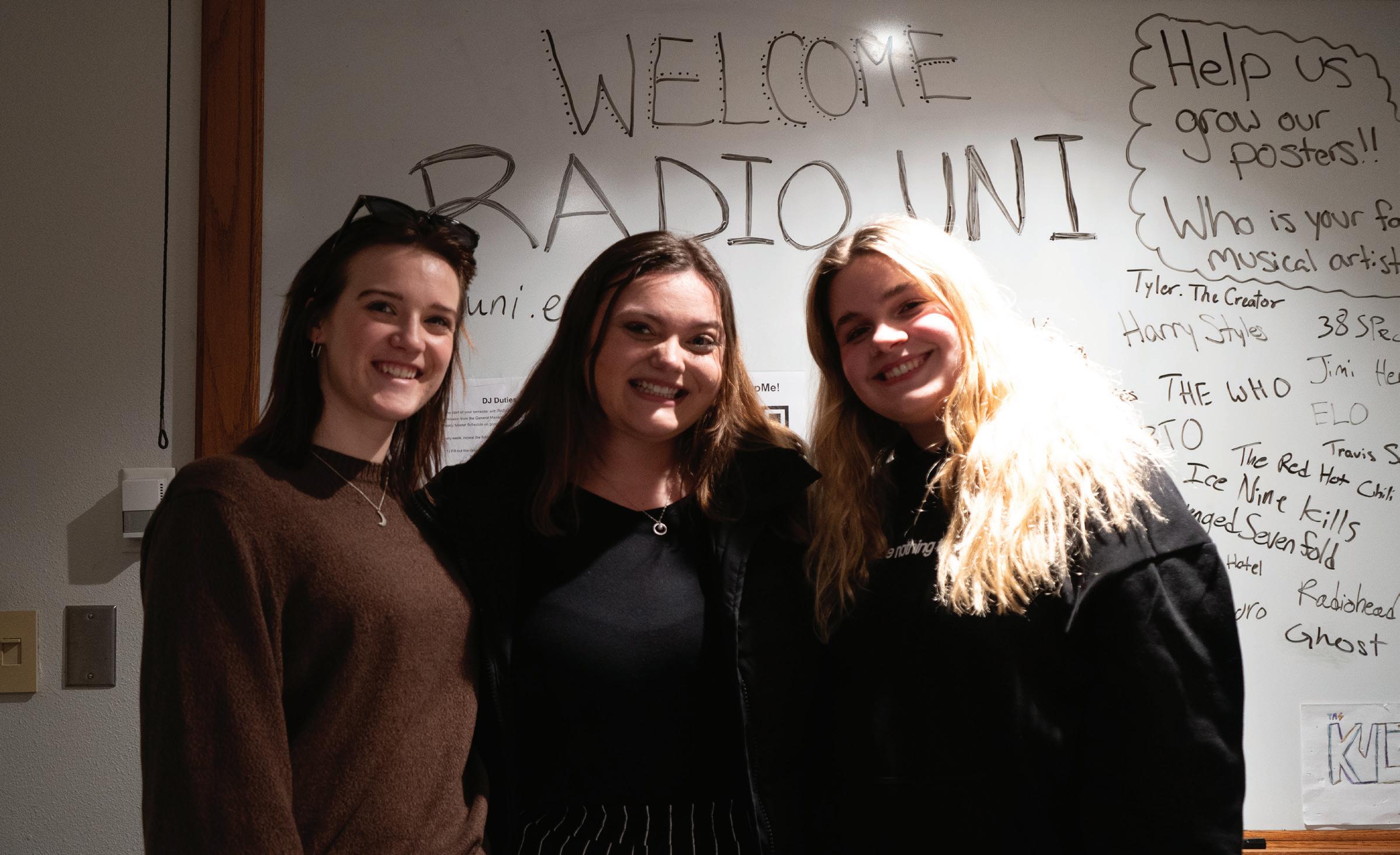
moving to streaming-only can also ease the DJs responsibilities. “Since we stream, we can record and replay shows if we want to,” Capman said.
“So if a DJ is out sick one day, we aren’t scrambling to fill their broadcast hour, we can just replay one of their older shows.” Capman says that this can help allow DJs to focus on being creative and providing a streaming show that people want to listen to.
As Radio UNI looks to the future, Capman hopes to continue to grow the station and cultivate a safe creative space for hosts and listeners. “Right now, we don’t have a budget,” said Capman. “In order to keep up with everything we want to do and keep going, we need to start fundraising. So, we’re absolutely looking for partnerships, ads, anything like that.” Alongside fundraising, Capman also hopes to continue to provide a space to allow DJs creative freedom. With the switch to streaming only, Capman says that the station no longer has to adhere to FCC broadcasting rules, which could open up new avenues for DJ creativity on the station.
Radio UNI has also changed locations. They formerly broadcasted out of the Keyhole Room in the Maucker Union basement and have since moved their operations to Lang, and now stream out of Lang 031. Radio UNI is available to stream at radio. uni.edu, and provides a calendar schedule for DJs and their shows
their website.
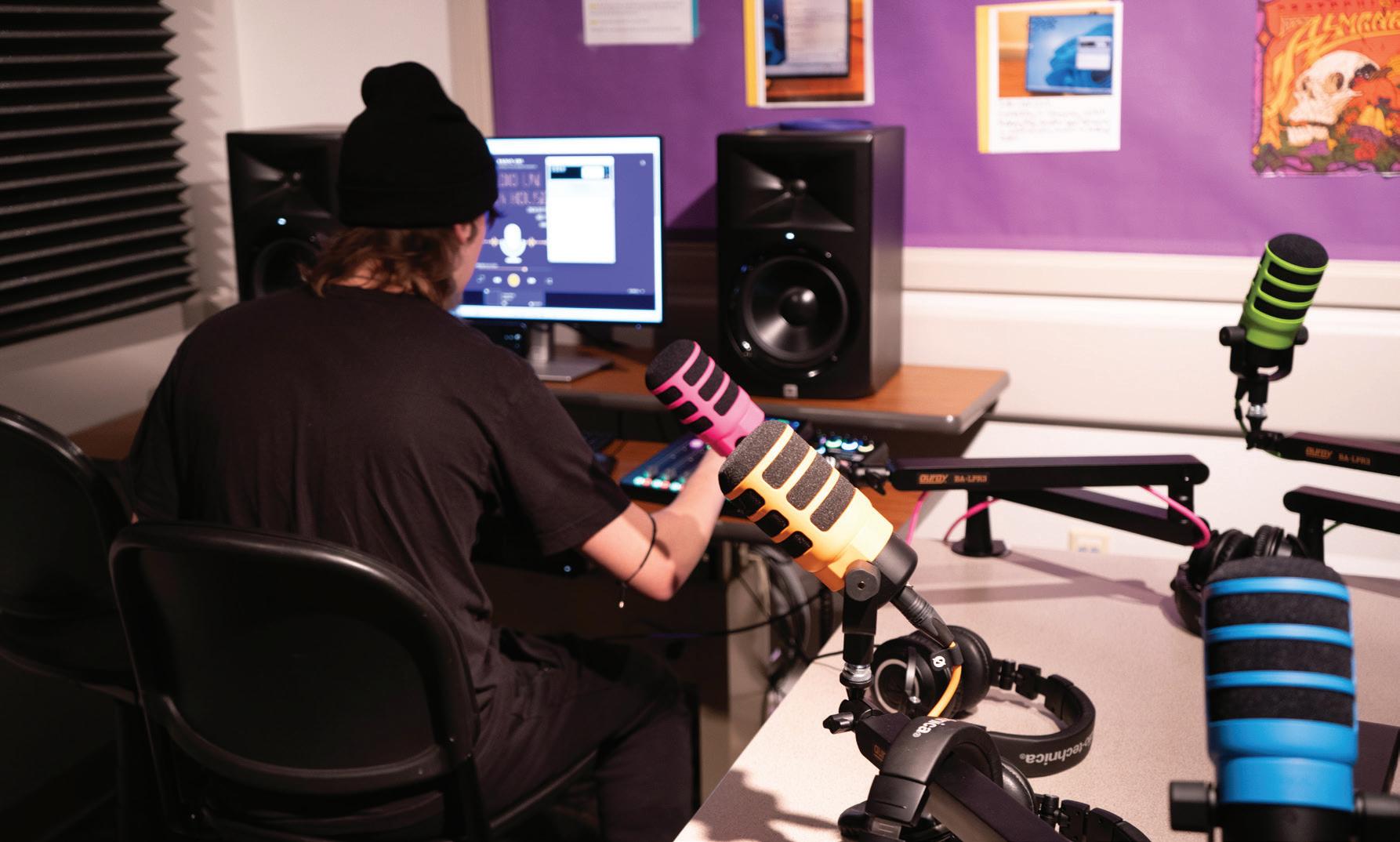
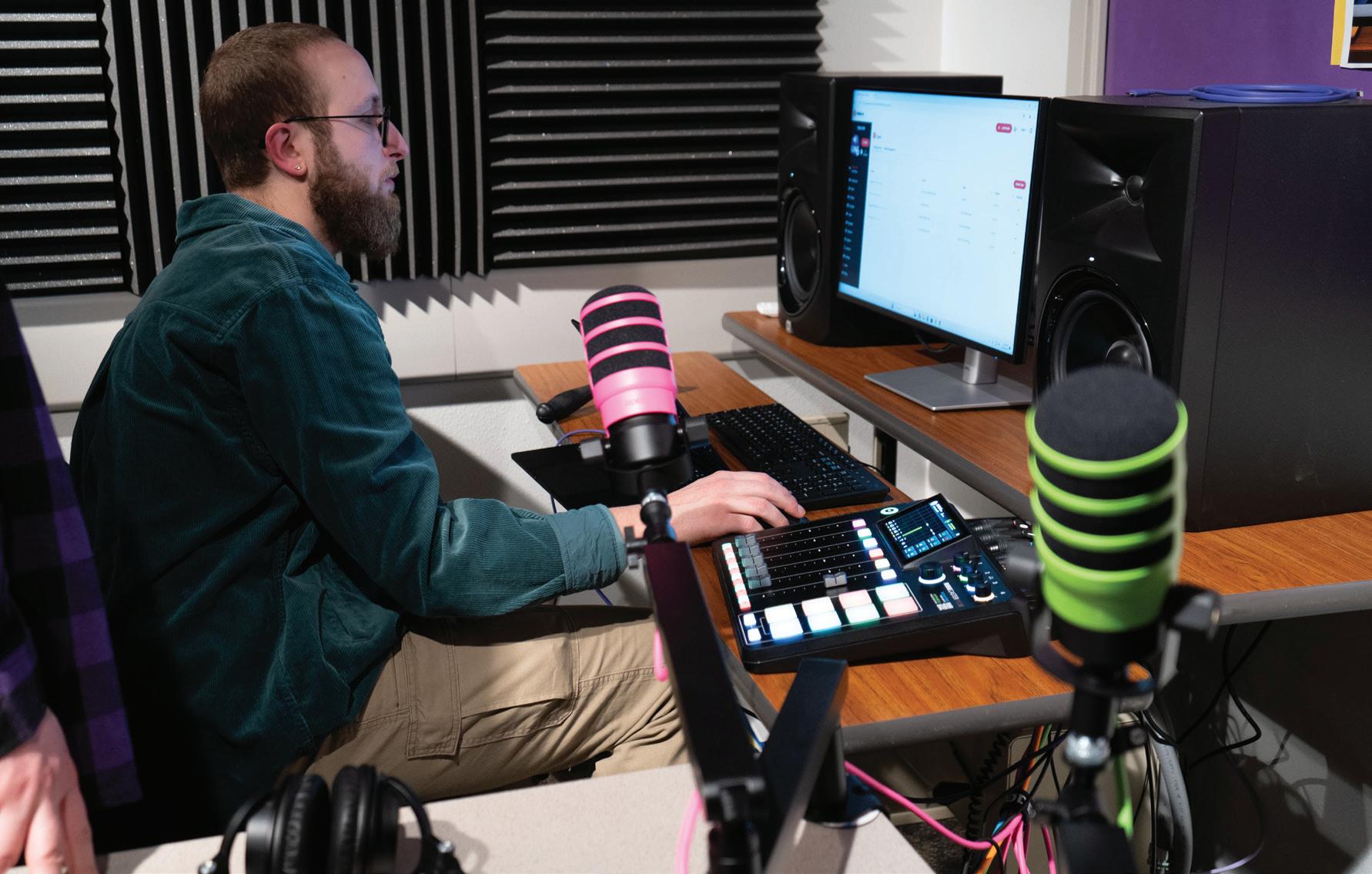

JENNA WESTENDORF Campus Life Editor
At one point, Iowa had more than 12,000 one-room rural schoolhouses operating across the state. Now, only three remain in use. However, many of them have been restored and operate as museums to remember what education once looked like across the state. One of those schoolhouses is located right on the UNI campus behind the Schindler Education Center.
The Marshall Center School was built in 1893 and was originally located in Pocahontas County. It cost $730 to make this school, which at the time was very expensive. According to Nathen Ardnt, director of the UNI Museum, the style of this school is very similar to other one-room schools but, possesses some distincitveness to it because it was from the East Coast. “Our school’s a little bit unique because it was built from a construction plan that was bought,” says Ardnt. The school has two entrances, which Ardnt believes were likely for male and female students, as that was more common on the East Coast than in Iowa.
The interior of the Marshall Schoolhouse had several oddities to it. One is the fact that the school has six windows, three on each side. “We can usually date schools by the amount of windows they have on there [the school],” stated Ardnt. At one point the state of Iowa had said that cross lighting was bad for students’ eyes, and so in many cases, one-room schools had no windows. However, Marshall still had its original windows until it was transported to UNI campus. Another oddity was the telephone installed in the school, which was installed in the 1930s. With the school being so far away from town and tornadoes being very common in Iowa, the phone was installed so they could warn the school of a tornado. That same telephone still survives in the school today.
The school was open until 1944 but eventually converted into a voting center and stayed open until 1986 when the school officially closed to the community. By happenstance, at this time UNI was beginning the search to bring a rural school onto campus. “We’re a teacher’s college, and we always think about the teachers that came here, what they did,” stated Ardnt. “It [the school] had criteria [to meet],
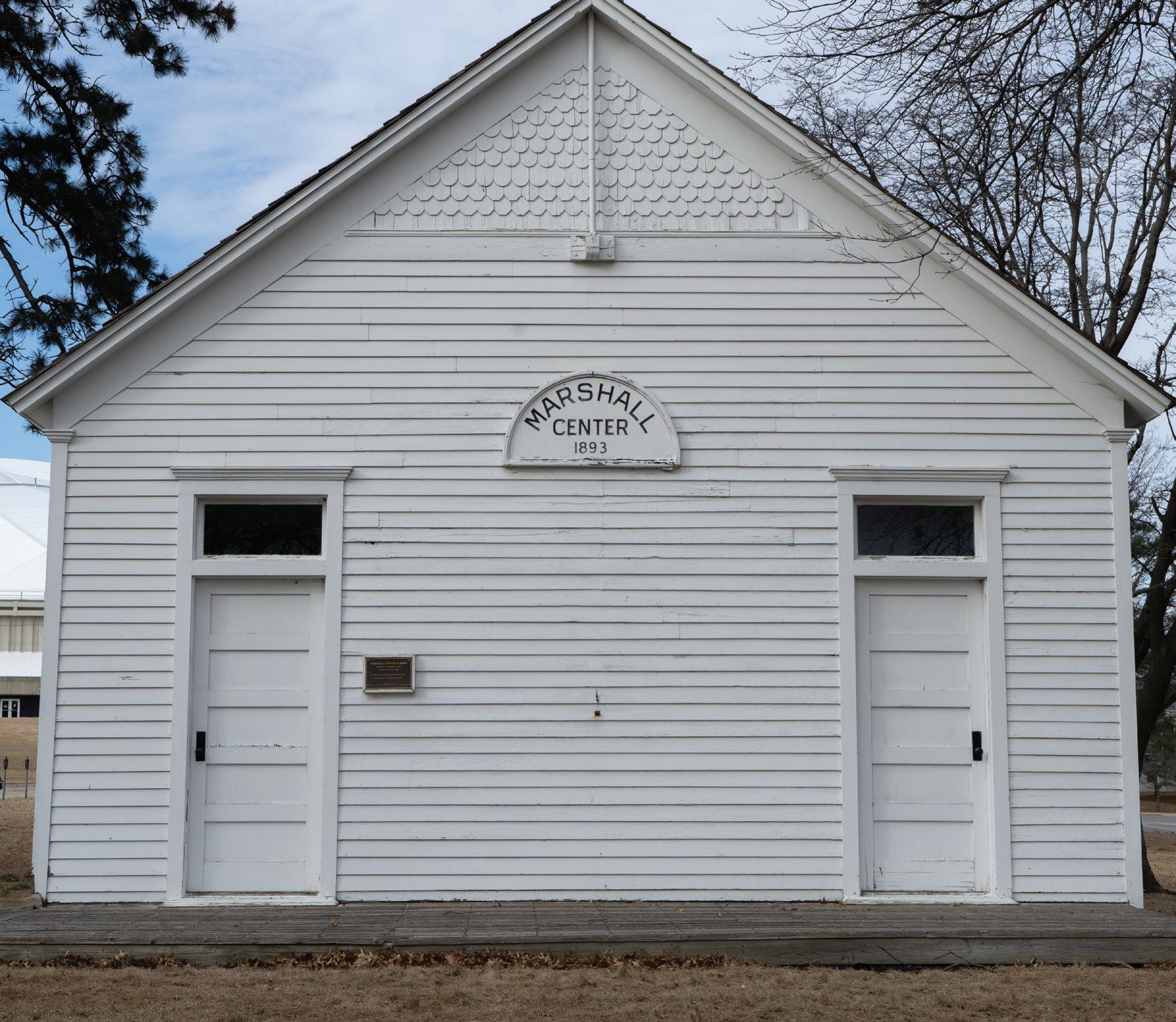
the school had to have some connection back to UNI, and had to tell a story about Iowa education.”
In 1987, after meeting this criteria, Marshall Schoolhouse was moved to the UNI campus. The school was then restored as close to what it once was in 1926, with the original wallpaper being duplicated as well as receiving a new roof, a new foundation, and a new electrical system. Ardnt feels that preserving the schoolhouse as it once was is crucial to show that idea of how education in Iowa once was. “Something we’re trying to do
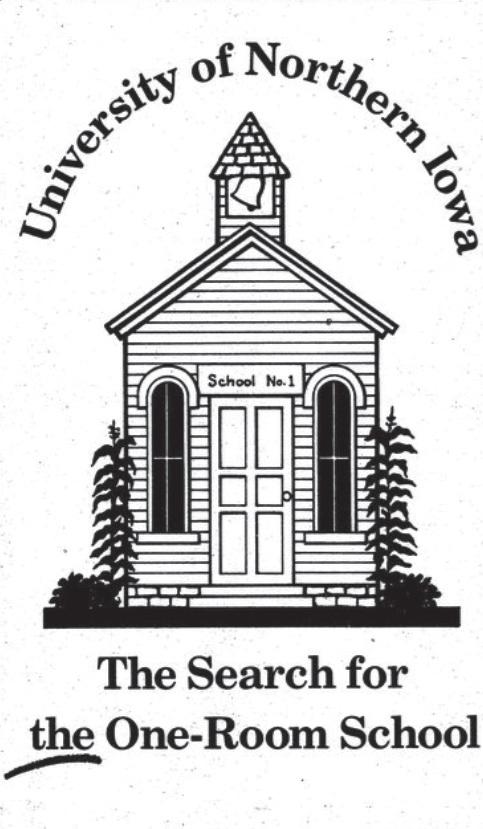
with the 150th anniversary being talked about … let’s look at what the teachers did after they left here, and the impact they had on the state and what that meant.”
In 1996, the school officially became part of the UNI museum and started incorporating interactive learning experiences. Groups of elementary students were brought to the school on field trips and authentic Christmas pageants from that time were hosted. The Friends of the UNI Museum, which was created in 1982 to support the work of the museum, played a very crucial role in bringing these events to life. It was also part of a collection at the museum, the rural school collection. “Part of the school’s consolidation was the records, the books, the documents, the photographs,” stated Ardnt. “We have most of them … but we are still actively collecting. This showed where they [teachers] taught, how they taught, and the results of that teaching.”
However, in 2012 there were a lot of shutdowns across campus, including the campus museum. Due to these closures, the school sat stagnant for three years before Rod Library took over both the museum and the schoolhouse in 2015. Since then the museum has been trying to figure out how to use this space.
“We’ve used it for exhibits, so we did a
with Silos and Smokestacks and opened the school for the public to come visit.” There are also several classes taught inside the schoolhouse includ-
an evaluator come and tell them exactly what needs to be done to make the building better. With the help of the UNI Friends group, the museum has a priority list of remodels and renovations to bring the building to where it needs to be. This includes things like a new deck, new paint, and installing a full HVAC system to preserve the structure of the building.
Post-COVID has made it difficult for museum staff to figure out what to do with the schoolhouse, whether they want to preserve the school as it was in 1926 or integrate modern things like technology. “We’ve talked about doing events there, it’s hopefully going to be part of an architectural tour,” stated Ardnt. Preservation methods and digital scanning have also been used, including a 3D tour of the school that was created by Jess Cruz, allowing people to explore the school digitally. The schoolhouse serves as a reminder of what rural school education once was in Iowa. When the rural schools were shut down it was said that rural education was not as good as city education, however, they eventually discovered that this was not true. “They discovered

From the Nov. 13, 1987 issue of the
Iowan, the Marshall Center School officially arrived to campus after a four day journey from Laurens, Iowa. ing the museum studies certificate class where the class talks about managing historical structures and buildings, as well as education classes that have gone there to experience what it would be like to learn in that setting. The museum has worked tirelessly over the years to restore the schoolhouse as accurately as possible while keeping it safe and up to date with modern requirements. When the school was moved to UNI, the campus helped pay for a brand-new cedar roof on it. The museum has also had
that kids were actually farther ahead in their studies and that they had built strong communities.” Ardnt believes that the values from rural schools are beginning to surface again, so making sure to preserve this history is more important than ever. In the future, Ardnt hopes that the Marshall Center School can be an open and active classroom again, and that one day the school will be open to the public for little to no cost to have the opportunity to show past and future generations the history of education in Iowa.

JOSUE VILLATORO Staff Writer
This past year has been quite the streak for horror filmmakers to bloom and has invited people to experience the genre without the reliance on jumpscares. Remakes are often unnecessary and usually become letdowns due to the attempts to modernize the subject at hand, over sticking to what made the original work stand out in the first place. But, that is not the case for Robert Eggers’ “Nosferatu.”
In recent years, Eggers has made a name for himself thanks to his knack for blending dark historical storytelling with horror and thriller elements. If that’s what you are hoping to see out of “Nosferatu,” then you get exactly that through this retelling of this iconic fictional figure. Here, he offers an immersive story with his love for establishing historically authentic and accurate dialects for the period he places his films in.
From there, we get to see some of the most stunning and eye-catching costume and production designs that encapsulate a chilling gothic atmosphere. Eggers shows most of this film in the dark, yet it never felt obscured with what was on screen, and it is incredible to see how he perfectly directed this film. The use of massive shadows brings out the film's dreadful nature with Jarin Blaschke returning as Egger’s cinematographer, as well as Louise Ford’s as editor. With those two in charge
of spectacle, we receive horror based not just on sound, but on visuals.
There is not one scene that feels contemporary with its practice or one that takes you out of the period the film is set in, which shows how well the research into historical accuracies has paid off. Words cannot stress how gorgeous this film looks and how great this turned out for the big screen, which is the best way to watch this film. It is unsettling to see how this film examines the psychology around suppressing an unhealthy desire by going to lengths of showing unnerving emotions that come from it, which the cast brings to life with this film.
Willem Dafoe gives a performance unlike any other in his career from the way he is presented, and it is apparent that he is looking to give something different yet exorbitant as he partners with Eggers for the third time. Aaron Taylor Johnson has had quite the career over the decade and has starred in a myriad of great films since, but this may be his best performance of recent years with how he utters his lines and delivers emotion.
Nicholas Hoult is on a streak with emotionally strong performances and is one of 2024’s most committed actors from the variety of films he has been in. Here, he gives an accurate depiction of shocked and terrified reactions to witnessing something not of this world. Which pays off perfectly with his scenes with Bill Skarsgaard, who gives
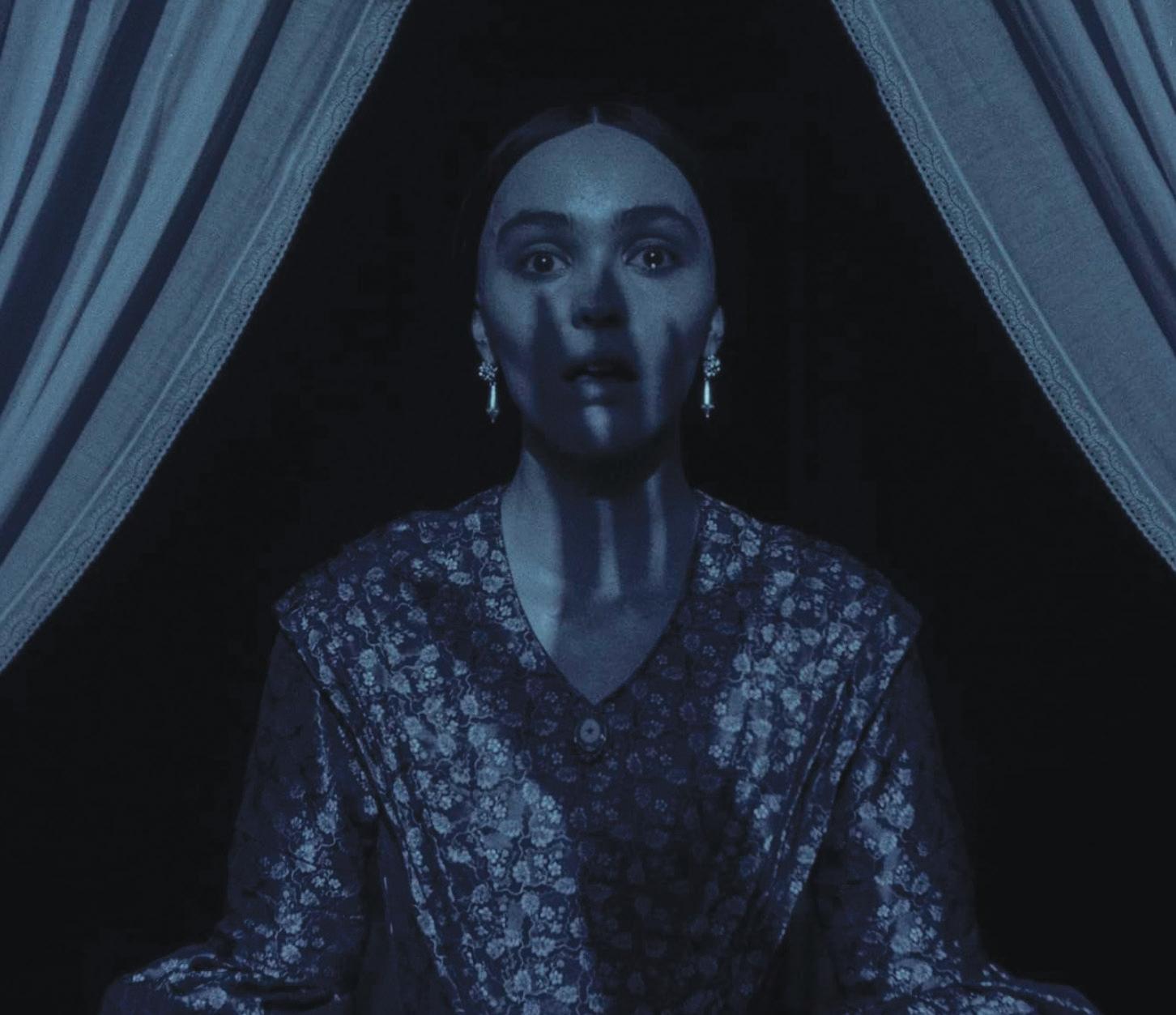
Nosferatu is a gloriously crafted rendition of the 1922 feature.
an insane performance with his transformation into Count Orlok, which will leave you completely speechless from the way he shows dismay and how they constructed his appearance.
Lily-Rose Depp is sensational in the work she is instructed to provide as Ellen. Depp delivers an unbelievable amount of emotional tension with her spiral into insanity and amatory, showing terror all in one without feeling over
the top or melodramatic. It may not be the scariest horror film of recent years, but at the same time, not all horror films are based around the concept of shivering the audience to the core with a jumpscare. It is easily one of the best vampire films we’ve gotten in a long time and has heightened the recent revival of the vampire sub-genre, years after the impact of “Twilight.” Not only one of the best horror films of the year, but cer-
tainly one of the best films of the year. It is the perfect way of discovering the iconic tale if you are unfamiliar with it and a great opportunity to explore the works of Eggers. “Nosferatu” is a gloriously crafted rendition of the 1922 feature, from its authentically harrowing environment and visuals, extremely enticing dialogue and splendid cast.


CARTER LUST Sports Writer
To conclude their threegame road stretch, the University of Northern Iowa women’s basketball team traveled to Des Moines, Iowa, to take on in-state rival Drake University. Each matchup between the two programs has been historically close, often coming down to the final seconds of play. The 101st meeting between the Panthers and Bulldogs on Feb. 1 was no exception, as Drake narrowly defeated UNI 69-63 at the Knapp Center.
Following the tip-off, both teams saw hot starts from beyond the arc, each knocking down their first pair of attempted 3-pointers. Mya McDermott and Shateah Wetering each sank a triple for the Panthers within the opening minute, keeping UNI tied with the Bulldogs for the first couple of beats of action. Wetering would finish with eight points and go 2-4 from 3-point territory, complimenting her three blocks and two steals on the defensive end.
After starting 2-2 from the field, Northern Iowa missed their next seven shots and allowed Drake to go on an 8-0 run to take a 6-14 lead midway through the first quarter. Having not scored in over four and a half minutes, senior guard Kaybe Laube finally ended the drought by connecting on a layup to bring the Panthers within six points. The sharpshooter is hitting
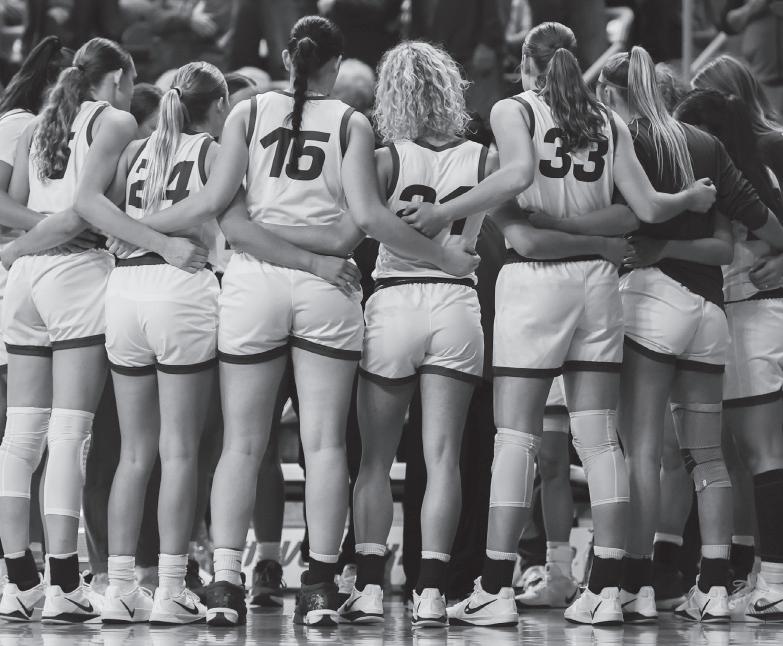
48.8.% of her long-range tries on the season but shot just 1-5 from deep in the loss. Laube ended the contest with five points and three boards. Following her layup, the Bulldogs extended their lead to 14-21 entering the second quarter.
A flurry of McDermott baskets helped the Panthers claw closer into winning territory after the short break, giving her team an eight-point lift in just over three minutes of play-
ing time. McDermott attempted to combat the increased foul line production Drake saw, as Bulldog Courtney Becker made two free throws to put her squad up 19-28. Drake shot 18 shots from the charity stripe and connected on 16, starkly contrasting the Panthers, who made just one free throw on two attempts.
With 6:14 left in the first half, Emerson Greene came off the bench to nail a triple off an assist from freshman
Elise Jaeger. Greene’s bucket brought the Panthers within two possessions before eventually entering the locker room trailing 33-39 at halftime. Greene played 24 minutes in her sixth-man role, scoring five points and securing three rebounds. Jaeger added two points and three steals for UNI.
Both teams struggled offensively in the third quarter, scoring only 10 points in a period littered with missed
shots and turnovers. However, this meant the Panthers were still within six points entering the final frame, only trailing 43-49.
Struggling to cut the Bulldogs’ lead to one possession, Northern Iowa head coach Tanya Warren again turned to McDermott to push the Panthers over the hump. With just 1:46 left and trailing by four, the star senior connected on a mid-range jumper to bring the Panthers within two points at 58-60. After Drake made two free throws, UNI forward Ryley Goebel put back a missed McDermott floater to keep the Panthers within a basket. Yet, two more Bulldog free throws stretched their lead out to four points before a timely McDermott 3-pointer cut the lead to 63-64. McDermott finished with a game-high 27 points on 10-22 from the field and 7-11 from long range. Goebel ended with seven points and a team-high four steals.
The Panthers’ one-point deficit would be the closest they got to victory as another series of Drake free throws rounded out the last seconds of play. Ultimately, UNI fell 63-69 and dropped to 10-11 overall and 5-5 in conference play.
The Northern Iowa women return to the McLeod Center on Friday, Feb.7, to host Bradley University in their second meeting of the season.
ADAM JOHNSON Sports Writer
On Sunday, Feb. 3 the Panthers played host to the Bradley Braves in the McLeod Center. The Panthers came into the game with a 7-4 conference record, while the Braves had a 9-2 conference record that had them at second place in the conference.
The game started out with both teams going back and forth. One team would have a little bit of a run, and the other would quickly respond with a run of their own. This was the trend until the Panthers started to pull ahead later in the first half. The score was 22-21 in favor of the Panthers, when they started to take over. Will Hornseth hit a couple of free throws, Tytan Anderson had two layups, and a couple of threes by Cael Schmitt had them on a 12-0 run. The run helped lead the Panthers to a 34-25 lead going into the halftime break.
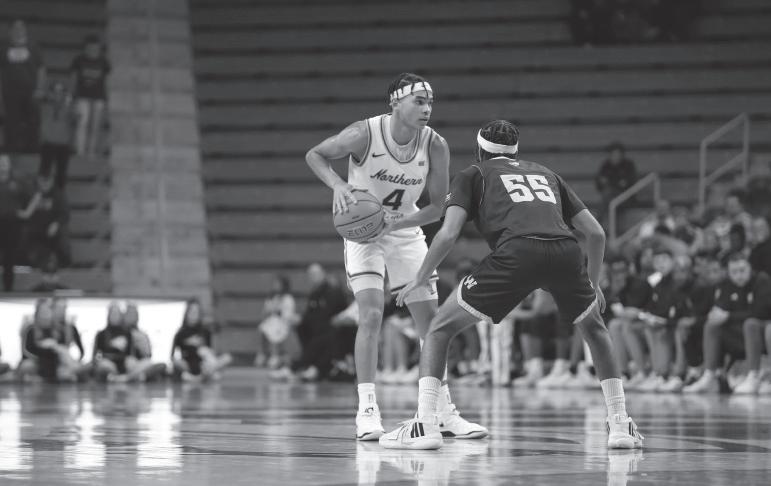
The Panthers came out of the break into the second half just as hot as they were to finish off the first. This time they went on a 9-0 run, and extended their lead to 18
points at 43-25. Throughout the rest of the second half the Panthers maintained, and even added on to their lead. The biggest lead the Panthers had was 29 points. With a lead that
big, the Panthers were able to coast the rest of the way to victory, winning 83-69. In one of the best performances by the Panthers so far this season, they had a
number of guys making key contributions. Max Weisbrod hit five threes and led the team in scoring with 18 points, Anderson nearly had a double-double with 17 points and nine rebounds and Schmitt and Jacob Hutson pitched in 12 points each. Ben Schwieger did a little bit of everything for the team, as he scored nine points, grabbed five rebounds and dished out five assists. The team as a whole knocked down eight three point shots. After securing what was a big conference win, the Panthers are now in sole possession of third place in the conference. They are a game behind Bradley and two games behind Drake.
The Panthers will look to keep the winning going when they travel to Missouri to match up with Missouri State on Wednesday, Feb. 5. After that game they will be back on the home court of the McLeod Center to face off with Illinois State on Saturday, Feb. 8.

NICOLE WATERS Sports Writer
The Panther swimmers headed to Sioux Falls this past weekend to compete at the Coyote Invite and brought home six titles. Swimming kicked off the two-day meet with the 200-yard free that saw Abby Lear, Morgan Meyer, Hannah Nedder, and Elyse Brayton take second (1:36.06), as Faith Larsen, Waren Graeve, Natalie Harris, and Ema Lavigne took fourth (1:36.54). Olivia Chambers placed second in the 200-yard IM (2:06.62) as Nikki Walters claimed fifth (2:09.83). Larsen, who is the two-time defending MVC Champion, took first in the event with a time of 23.67 as Lear captured third at 24.02.
On day two of the action, Brayton, Lavigne, Larsen and Meyer took second in the 200-yard medley relay (1:45.92) as Lear, Jenna Breitbach, Nedder and Graeve finished fourth (1:48.01). Walters picked up first in the 100-yard but-
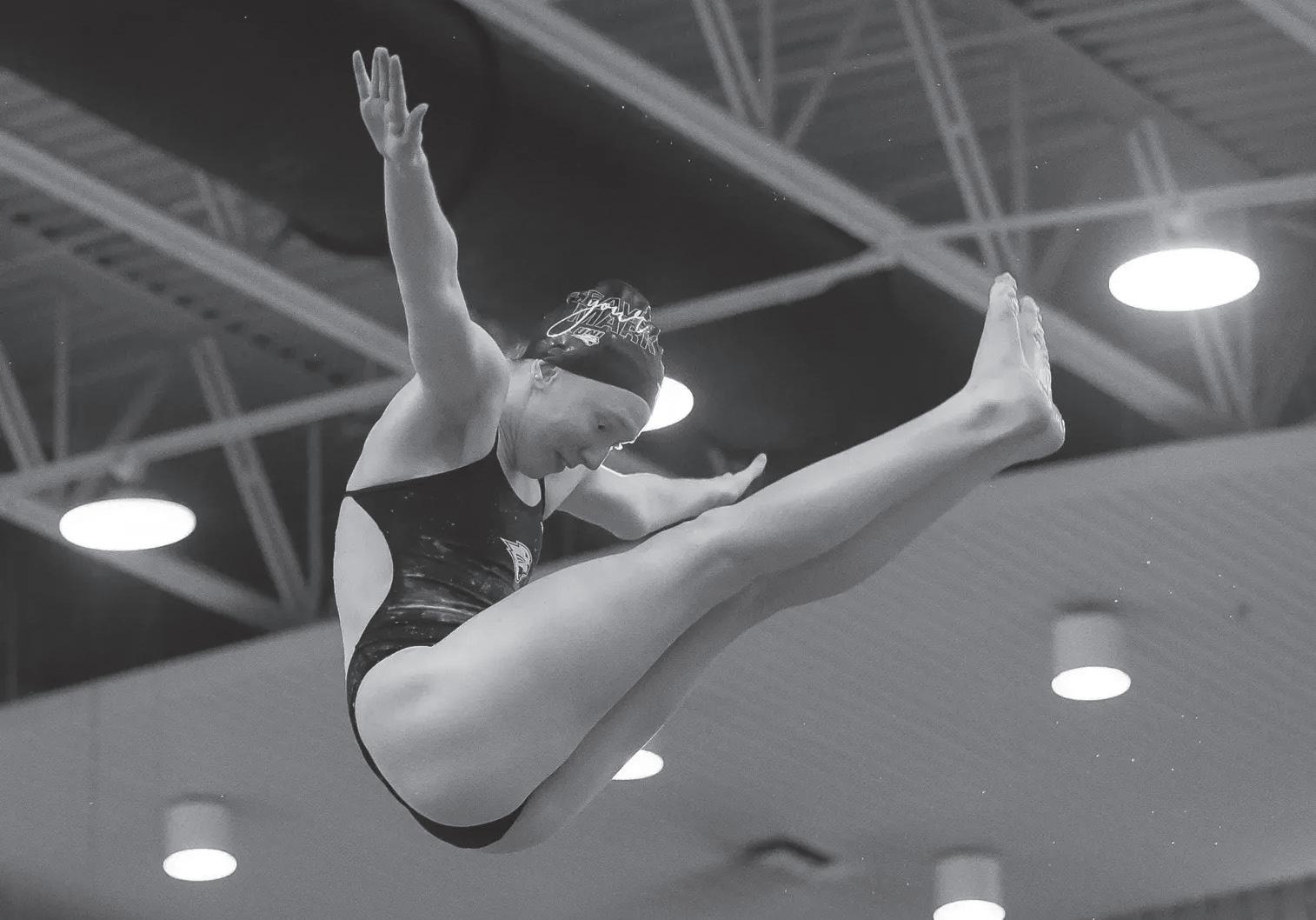
terfly (56.91) while Abby Steward took third (58.10) and Lavigne in fifth (58.51). Chambers and Harris took first and second in the 200yard freestyle with times of
1:53.70 and 1:53.75.
Larsen took second in the 100-yard breaststroke at 1:06.03 as Brayton took second in the 100-yard backstroke at 57.80, while Steward
followed in third (57.97) and Lear in fifth (58.31). Larsen found her way back to the top in the 100-yard IM with a time of 57.52 as Lavigne placed second in the
event (57.84). Chambers and Meghan Pallett earned fourth and fifth in the event with times of 59.68 and 1:00.00. Meyer took top prize in the 200-yard backstroke with a time of 2:04.62.
Walters also found her way back to the top in the 200yard breaststroke at 2:26.44 as Aspen Cole placed fifth in the event (2:29.13). Harris placed fourth in the 100yard freestyle with a time of 53.84, while Sam Oeltjen took fourth in the 200-yard butterfly at 2:11.62 to close out competition.
The divers began on the 1-meter boards on Friday night with Erica Peters taking second with a score of 251.55, followed by Avery Hogan in fourth (239.60). Trista Thompson found her way to sixth (232.60) and Abby Hutchins in eighth (224.05). The three-meter competition saw Hogan take second with a score of 259.20 as Peters followed in fourth (257.15) and Hannah Taylor earned sixth (248.60).

MICHAEL SPAHN Sports Writer
After 22 weeks of football, we finally have our two finalists competing in the 2025 Super Bowl.
The Chiefs will be the AFC representative, as they defeated the Bills 32-29 in a close Conference Championship matchup. The Eagles will be the NFC representative winning dominantly against the Commanders in Philadelphia. The Chiefs can be the first NFL team to win three straight Super Bowls.
Patrick Mahomes is having a phenomenal year with a receiving core that has overachieved. The team acquired DeAndre Hopkins mid-season and has provided a stable veteran option for Mahomes. Rookie Xavier Worthy has been a great find in the draft, adding a lot of speed.


Along with the receiving core, tight end Travis Kelce has continued to be Mahomes’s most reliable target as he searches for his fourth Super Bowl ring.
The key for the Eagles will be maintaining constant pressure on Mahomes and keeping him in the pocket. He’s most dangerous when he is on the run, ad-libbing plays and finding open guys.
Eagles defensive linemen Jalen Carter, Jordan Davis and Josh Sweat will have to be consistent throughout the game maintaining pressure.
The final key for the Eagles is sticking to Kelce underneath.
Kelce does a great job finding the weak spot in the defense to get open. He and Mahomes have great chemistry and execute those plays beautifully.
The Eagles have been phenomenal on offense all season led by running back Saquan
Barkley. Not to mention quarterback Jalen Hurts, along with receivers A.J. Brown and Devonta Smith can make a big play at any moment.
The main goal for the Chiefs will be to stop Barkley. When he gets into a rhythm it’s game over for any opposing defense. George Karlaftis and Chris Jones have done a phenomenal job up front stopping the run along with linebackers Leo Chenal and Nick Bolton. They will need all hands on deck to stop Barkley.
Building off takeaway number one: The Chiefs need to make Jalen Hurts prove he can beat them with his arm. Throughout the playoffs, Hurts has made phenomenal plays, but has relied on Barkley and the run game a lot. If the Chiefs can take away Barkley, I would roll the dice and see if Hurts can beat them with his arm.
Prediction: Chiefs 34 Eagles 21
The storyline all season for the Chiefs is that they always find a way to win.
Given they have won this
game three times before in the Mahomes-Reid era, I see them controlling this game from the start and emerging victorious in the end.
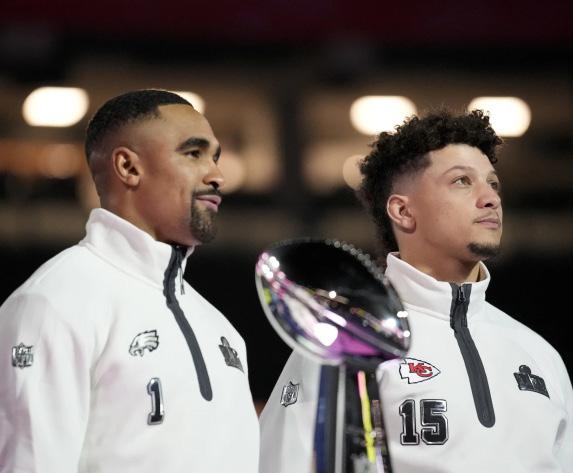
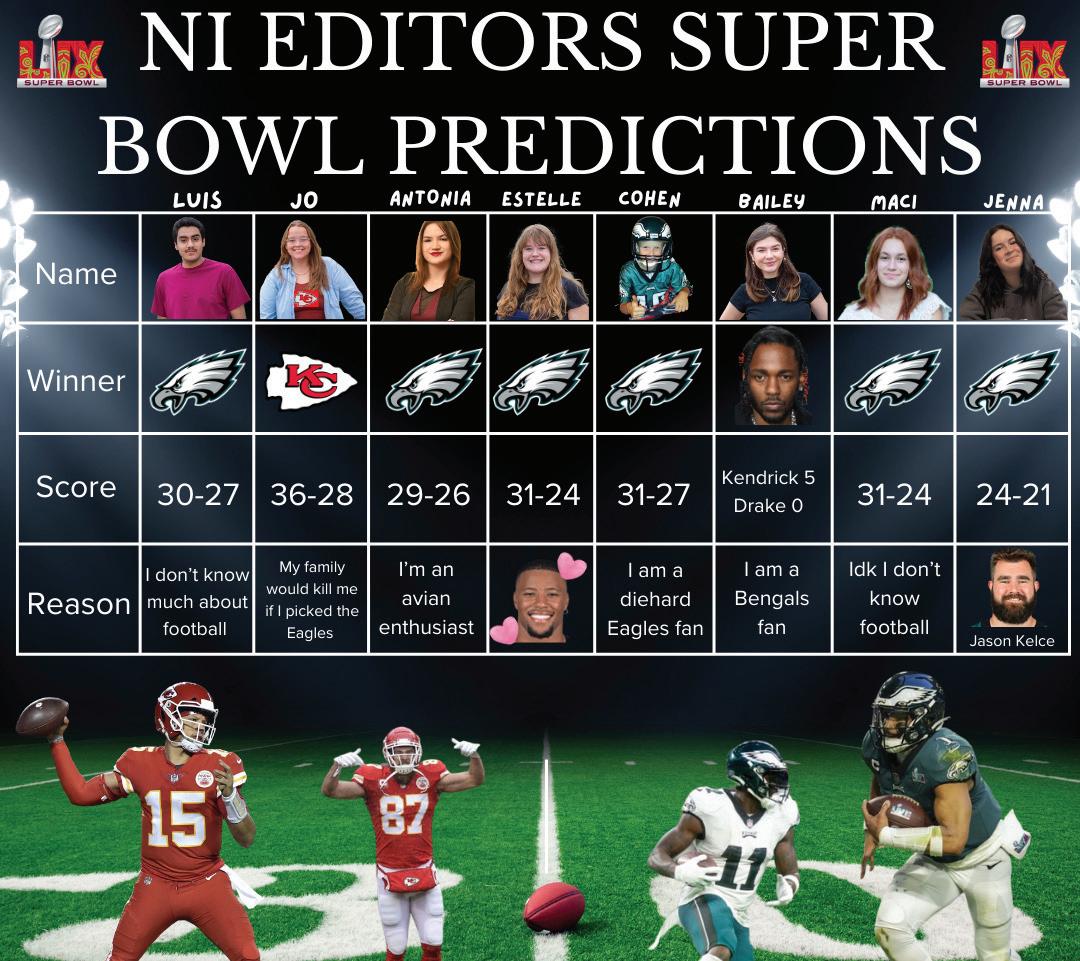


Across
1) Regrets
5) Emirate inhabitants
10) More than diet
14) Dreaded character
15) Not secure, as a gem
16) Handbag for needles
17) Hunter's prey, sometimes
20) Cold pie
21) Cozy place on a winter's night
22) "_ Island" (2008 film)
24) Conger
25) Flanders on TV
26) A 2 may stand for it (Abbr.)
29) Military vehicle
31) Make a decision
33) Car part
35) Raze (with "down")
37) Big fuss
41) What some take on a tough issue
44) It's just part of an act
45) A deadly sin
46) "Or_!" (veiled threat)
47) Commercial come-ons
49) Period of service
51) Archer's wood
52) Dec. 24, for one
55) "_ be an honor"
57) " ... as bad as they_"
59) They're used to pitching
62) Buy in a hurry
66) Yellow-and-ebony flowers
68) English river to the Trent
69) Blender setting
70) Baby foxes
71) Dandelion, for one
72) Go on a spree
73) Money swallower
1) Baseball's "Schoolboy"
2) Expressions of disdain
3) "CHiPs" star Estrada
4) Arrive, as darkness
5) Robots
6) Some strands in a cell
7) "_ I care!"
8) Be in contradiction with 9) Like most new TV's
10) Some badge flashers
11) Had a home-cooked meal
12) Fancy leather
13) Ready to crash
18) Send forth
19) Oracle site
23) Fishhook-attaching line
26) Team supporters
27) Business bigwig, briefly
28) Melancholy
30) Not fixable
32) Bag type
34) Catania's volcano
36) Fragrant flowers
38) Well-lubricated
39) Sprinkler hookup
40) Over again
42) Debts, ledgerwise
43) Ready for a vacation?
48) Brews, as tea
50) McDonald's board
52) Bend like an arch
53) Worth
54) Cover your tracks?
56) Become free of moisture
58) Disguise parts, sometimes
60) Chilled, in a way
61) Like the Sahara
63) Milkmaid's need
64) "Render therefore _ Caesar ..."
65) Confidential call
67) Leonine lair
